A Journey into History, Culture, and Natural Beauty
Northern Cyprus: A Hidden Gem in the Mediterranean
Nestled in the heart of the Mediterranean Sea, Northern Cyprus stands as an untouched paradise, offering a rich tapestry of history, vibrant culture, and breathtaking natural beauty. Embark on a journey through time, immersing yourself in the remnants of ancient civilizations like Greek, Roman, Byzantine, and Ottoman empires. Wander through the divided capital of Nicosia, witnessing the confluence of two cultures and histories. Explore ancient castles like St. Hilarion and Kantara, and get lost in the echoes of the past.
The people of Northern Cyprus are renowned for their warm hospitality. Discover their unique customs and traditions, and savor the delectable flavors of Turkish, Greek, and Middle Eastern cuisine. Stroll through vibrant bazaars, seeking out handcrafted souvenirs and treasures. Immerse yourself in the lively music and dance, experiencing the vibrant culture that pulsates through this land.
Delving into the Details:
Where is Northern Cyprus?
Officially known as the Turkish Republic of Northern Cyprus, Northern Cyprus occupies the northeastern portion of the island of Cyprus. It is separated from the Republic of Cyprus in the south by a UN-administered Green Line.
Strategically situated in the Mediterranean, Northern Cyprus serves as a bridge between Europe, Asia, and the Middle East. This has transformed it into a significant hub for trade and culture.
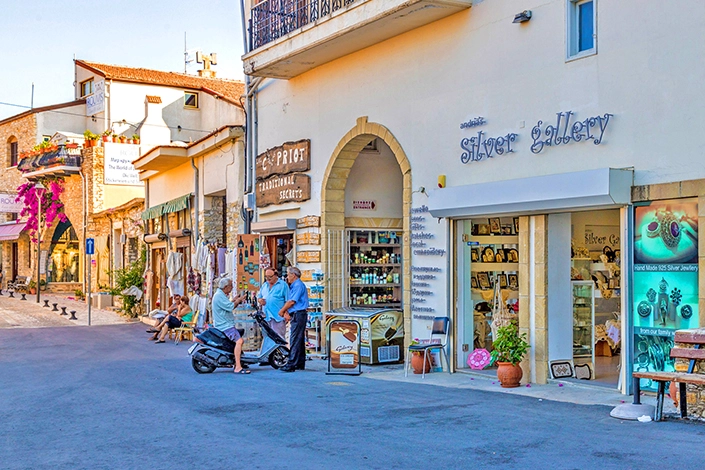
A Rich Historical Tapestry
Northern Cyprus boasts a rich history spanning millennia, having witnessed the rise and fall of various civilizations, including Greek, Roman, Byzantine, and Ottoman empires. This legacy is evident in the country’s architecture, cuisine, music, and other cultural aspects.
Explore the Enchanting North
Uncover Historical Gems:
Nicosia: The divided capital, a fascinating blend of cultures and histories.
St. Hilarion Castle: An 11th-century castle perched atop a mountain, offering panoramic views.
Kantara Castle: A 10th-century castle overlooking the Mediterranean Sea.
Salamis: An ancient Greek city-kingdom, boasting ruins and archaeological treasures.
Bellapais Abbey: A medieval Gothic abbey with stunning architecture and views.
Embrace the Vibrant Culture
Experience Warm Hospitality: Immerse yourself in the welcoming warmth of the Cypriot people.
Indulge in Culinary Delights: Savor the diverse flavors of Turkish, Greek, and Middle Eastern cuisine.
Explore Traditional Markets: Discover handcrafted souvenirs and treasures in vibrant bazaars.
Immerse in Local Music and Dance: Experience the lively rhythms and vibrant folk dances.
Embrace the Natural Beauty
Golden Beaches: Bask in the sun and swim in the crystal-clear waters of the Mediterranean.
Rugged Mountains: Hike through the Troodos Mountains and explore hidden villages.
Serene Forests: Wander through lush forests and discover hidden waterfalls.
Picturesque Villages: Explore traditional villages and experience the authentic charm of Northern Cyprus.
Planning Your Trip
- Visa Requirements: Check visa requirements for your nationality.
- Currency: The official currency is the Turkish lira (TRY).
- Language: Turkish is the official language, but English is widely spoken.
- Transportation: The main airport is Ercan International Airport (ECN).
- Accommodation: A variety of hotels, apartments, and villas are available.
Whether you’re seeking a historical adventure, a cultural immersion, or a tranquil escape, Northern Cyprus promises an unforgettable experience. Discover the hidden gem of the Mediterranean and embark on a journey that will leave you captivated.
Nicosia: The Capital of Two Worlds
Nicosia, the capital of Northern Cyprus, is a unique city divided into two distinct parts: the northern (Turkish) and southern (Greek) sectors. Each side offers its own captivating attractions, making it an unforgettable destination to explore.
With a rich history spanning over 3,000 years, Nicosia has witnessed the rise and fall of various civilizations, including Greek, Roman, Byzantine, and Ottoman. This legacy is evident in its architecture, historical landmarks, and charming old neighborhoods.
Girne: A Vibrant Coastal Gem
Beyond Nicosia, Girne emerges as another prominent city in Northern Cyprus. This bustling coastal town serves as a popular tourist hub, enticing visitors with its ancient castle, picturesque harbor, sandy beaches, and a plethora of water sports activities.
Famagusta: A Historical Harbor Town
Steeped in history, Famagusta, once one of the wealthiest cities in the Mediterranean, boasts stunning beaches, historical sites, and captivating ancient ruins.
Embrace the Mediterranean Climate
Northern Cyprus basks in a delightful Mediterranean climate, characterized by warm, dry summers and mild, wet winters.
Summer:
Temperatures: Average temperatures range between 25°C to 35°C (77°F to 95°F)
Rainfall: Rainfall is scarce during summer, typically occurring in brief showers
Sunshine: Summer days are abundantly sunny, with extended daylight hours
Winter:
Temperatures: Average temperatures hover between 10°C to 15°C (50°F to 59°F)
Rainfall: Rainfall increases during winter, often in the form of rain and occasional snowfall
Sunshine: While sunny days persist, winter experiences fewer daylight hours compared to summer
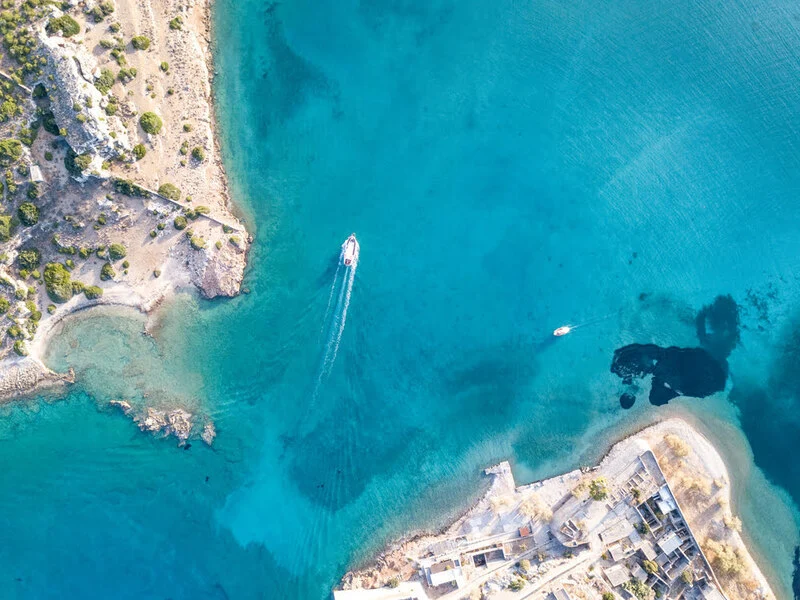
Reasons to Visit Northern Cyprus
History and Culture: Immerse yourself in the region’s rich history and diverse culture, evident in its architecture, landmarks, cuisine, music, and traditions.
Natural Beauty: Discover pristine beaches, turquoise Mediterranean waters, lush mountains, deep valleys, and captivating caves.
Warm Hospitality: Encounter the warm and welcoming locals who are always eager to assist and share their traditions.
Affordability: Enjoy a cost-effective travel experience compared to other European destinations.
Visa Requirements
Visa requirements vary depending on your nationality.
Visa-Exempt Countries for 90 Days:
European Union (excluding Bulgaria, Romania, and Croatia)
Andorra, Angola, Antigua and Barbuda, Argentina, Australia, Bahamas, Barbados, Belize, Bhutan, Brazil, Brunei, Bulgaria, Canada, Chile, Colombia, Comoros, Costa Rica, Dominica, Dominican Republic, Ecuador, El Salvador, Fiji, Gabon, Gambia, Georgia, Ghana, Grenada, Guatemala, Guinea, Guinea-Bissau, Guyana, Haiti, Honduras, Hong Kong, Iceland, Israel, Jamaica, Japan, Jordan, Kenya, Kiribati, South Korea, Kosovo, Kuwait, Lesotho, Liberia, Liechtenstein, North Macedonia, Madagascar, Malawi, Malaysia, Maldives, Mexico, Micronesia, Moldova, Monaco, Mongolia, Montenegro, Mauritania, Mauritius, Mozambique, Namibia, Nepal, New Zealand, Nicaragua, Nigeria, Palau, Panama, Paraguay, Peru, Philippines, Qatar, Romania, Russia, Saint Kitts and Nevis, Saint Lucia, Saint Vincent and the Grenadines, Samoa, San Marino, São Tomé and Príncipe, Saudi Arabia, Seychelles, Singapore, Solomon Islands, Somaliland, South Africa, South Korea, Sri Lanka, Suriname, Switzerland, Taiwan, Tanzania, Thailand, Timor-Leste, Tonga, Trinidad and Tobago, Turkey, Tuvalu, Uganda, Ukraine, United Arab Emirates, Uruguay, Uzbekistan, Vanuatu, Vietnam, Western Samoa, Zambia, Zimbabwe
Visa-Exempt Countries for 30 Days:
Bahrain, China, Egypt, Indonesia, Iran, Iraq, Jordan, Lebanon, Libya, Maldives, Oman, Palestine, Qatar, Saudi Arabia, Serbia, Syria, Tunisia, UAE, Yemen
Important Notes:
- Verify the latest information on the official embassy website.
- Visa requirements may differ for minors and individuals above 65 years old.
- A valid passport is mandatory for entry.
- Secure return tickets and accommodation bookings.
- Obtain appropriate travel insurance.
- Familiarize yourself with Northern Cyprus’s weather, culture, and customs
Best Time to Visit North Cyprus
If you’re seeking warm, sunny weather, the best time to visit North Cyprus is between April and October. During these months, average temperatures range from 25 to 35 degrees Celsius (77 to 95 degrees Fahrenheit) with minimal rainfall. These conditions are ideal for outdoor activities like swimming, sunbathing, sightseeing, and hiking.
For cooler, wetter weather, November to March is the most suitable time to visit. During this period, average temperatures hover between 10 to 15 degrees Celsius (50 to 59 degrees Fahrenheit) with increased rainfall. These conditions are perfect for mountain trekking, exploring historical and cultural sites, and enjoying the tranquility and serenity.
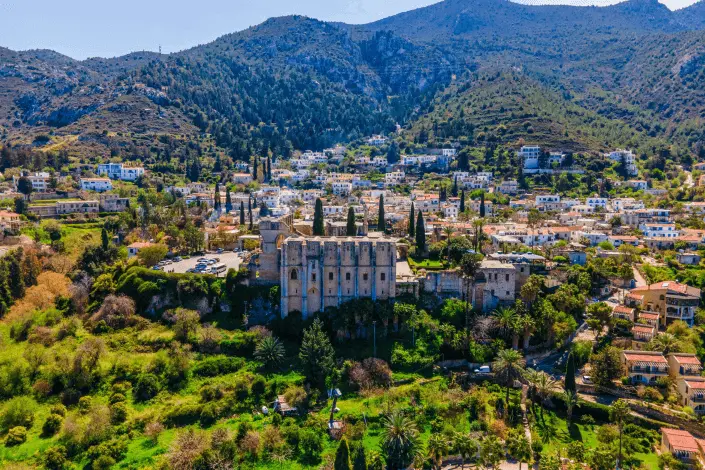
North Cyprus Attractions
For history buffs, consider checking out these must-visit destinations:
- Ancient City of Salamis: One of the largest and most significant ancient cities in Cyprus, dating back to the 11th century BC. It’s located near Famagusta on the Karpaz Peninsula.
- St. Hilarion Castle: A medieval castle perched atop a mountain near Kyrenia. Built in the 11th century by the Byzantines, it held great importance due to its strategic location. Panoramic views of Kyrenia and the coastline, churches, towers, and defensive walls are among its highlights.
- Buffavento Castle: A Byzantine castle situated atop a mountain near Karpaz. Constructed in the 7th century by the Byzantines, it served as a fortress to protect the area from attacks.
- Lala Mustafa Pasha Mosque: Located in Famagusta, this mosque is situated on AŞIK VEYSEL SOK KARAKOL, near the KarakoL Gate and OMER PASHA Square. Built in the 16th century by Lala Mustafa Pasha, the Grand Vizier of the Ottoman Empire, it originally served as the Saint Nicholas Cathedral before being converted into a mosque after the Ottoman conquest of Cyprus.
- Nicosia, the capital, is another historic gem, captivating visitors with its Venetian walls, Famagusta Gate, Selimiye Mosque, and Hagia Sophia Cathedral. Additionally, Famagusta, a historic port city, is a great destination with ancient ruins, including the Ancient City of Salamis and St. Barnabas Cathedral.
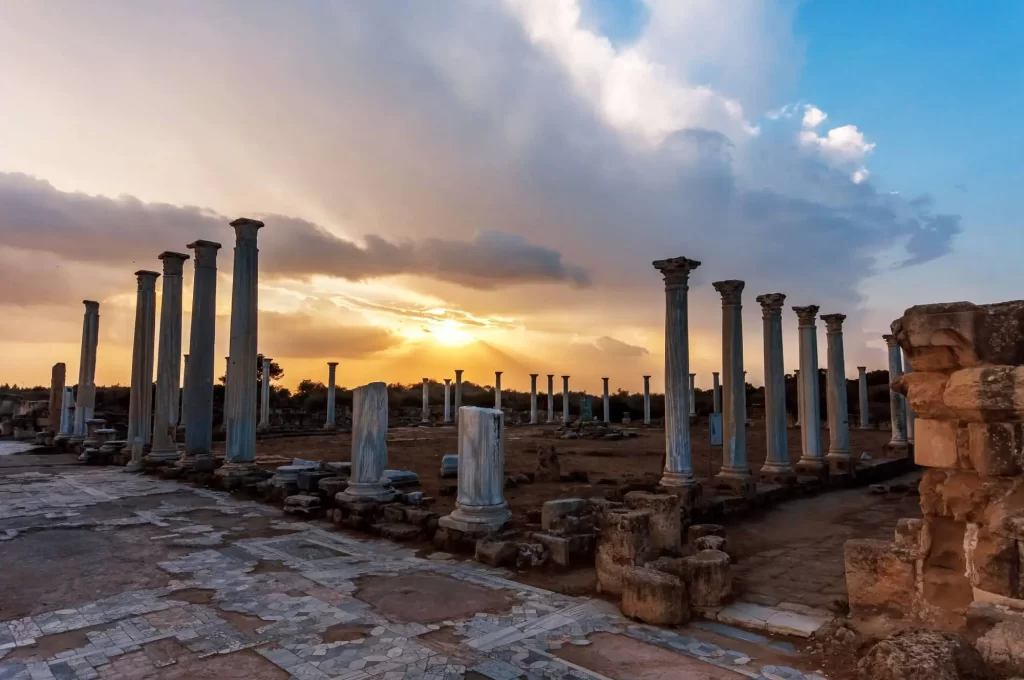
North Cyprus Natural Wonders
- Karpaz Peninsula:
Location: Northernmost point of North Cyprus
Attractions: Untouched nature, secluded beaches, unique wildlife, Karpaz Lighthouse, Dipkarpaz village, Turtle Beach, Karpaz National Park - Five Fingers Mountain:
Location: Near Kyrenia
Attractions: Panoramic views of North Cyprus, hiking trails, rock climbing, caves - Karpaz National Park:
Location: Karpaz Peninsula
Attractions: Salt lakes, wildlife, natural scenery, hiking trails - Kyrenia Waterfalls:
Location: Near Kyrenia
Attractions: Beautiful waterfalls, hiking trails, picnics - Beaches:
Turtle Beach: Nesting ground for sea turtles
Golden Sands Beach: Golden sands, turquoise waters
Baklava Beach: Beautiful rocks, panoramic views
Catalk Beach: Restaurants and cafes - Pine Forests:
Location: Troodos Mountains
Attractions: Hiking, picnics, camping - Lush Valleys:
Alaca Kilise Valley: Rock-cut church, beautiful scenery
Solea Valley: Hiking trails, traditional villages - Caves:
Kantara Cave: Sea cave, stalactites and stalagmites
Ayia Napa Caves: Prehistoric wall paintings - Hot Springs:
Calis Springs: Therapeutic properties, traditional baths - Salt Lakes:
Larnaca Salt Lake: Migratory birds, natural scenery
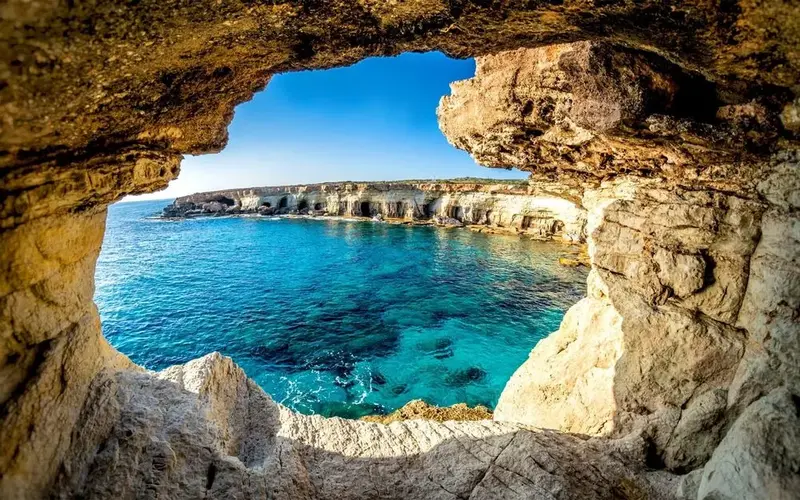
Living in Northern Cyprus
Advantages of Living in Northern Cyprus:
- Low Cost of Living: The cost of living in this country is significantly lower than in many European and North American countries. Housing, food, transportation, and other expenses are very affordable compared to other parts of Europe.
- Climate: This land enjoys a Mediterranean climate with hot, dry summers and mild, wet winters. This climate is ideal for those seeking warm, sunny weather.
- Safety: Cyprus is a safe country with low crime rates. This makes it a peaceful and secure place to live.
- Healthcare: The healthcare system in this country is generally good and affordable. There are numerous hospitals and clinics throughout the country, and access to healthcare is readily available.
- Education: The education system is considered good and affordable. There are many public and private schools throughout the country, and access to quality education is available to everyone.
- People: The people of this land are known for their warmth and hospitality. They typically speak Turkish and English and enjoy welcoming visitors to their country.
- Nature: Northern Cyprus boasts beautiful and unspoiled nature. Stunning beaches, lush mountains, and traditional villages are among the natural attractions of this country.
- Culture: The culture of this part of the world is rich and diverse. It is a blend of Turkish, Greek, and European cultures. Festivals, customs, and diverse cuisines form part of the rich culture of this country.
- Location: Cyprus is strategically located in the Mediterranean. It is close to neighboring countries like Turkey, Syria, Lebanon, and Israel, and provides easy access to Europe, Asia, and Africa.
Disadvantages of Living in Northern Cyprus:
- Political Status: This country is not a politically recognized state. This can impact some aspects of life, such as travel and work.
- Language: The main language of Northern Cyprus is Turkish. If you are not fluent in this language, you may face challenges in communicating and conducting daily activities.
Job Opportunities: The job market is considered relatively small. Finding a suitable job with a good salary can be somewhat difficult.
Cost of Living
The cost of living in this country is significantly lower than in many European and North American countries. The exact amount of expenses will depend on your lifestyle, location, and spending habits.
However, in general, you can expect:
- Housing: Renting a one-bedroom apartment in the city center costs around $500 per month. Renting in suburban areas is cheaper.
- Food: Grocery expenses in this country are very affordable. A simple meal at a restaurant costs around $10. You can save money by cooking at home.
- Transportation: The public transportation system in Northern Cyprus is limited. Buses and minibuses operate in major cities, but they may not always be on time. Taxis are inexpensive, but for long distances, they can be expensive. Many people in Northern Cyprus use motorcycles or bicycles for transportation.
- Utilities: Utility costs like electricity, water, and gas are very low.
- Entertainment: The cost of entertainment in Northern Cyprus depends on your activities. Activities like going to the cinema, concerts, and bars can be expensive, but there are also free and inexpensive activities like hiking, swimming in the sea, and visiting museums.
Tips for Reducing Living Expenses in Northern Cyprus:
- Rent an apartment in a quiet neighborhood away from the city center.
- Cook your own meals instead of eating out at restaurants.
- Use public transportation or buy a motorcycle or bicycle.
- Take advantage of free and inexpensive entertainment activities.
- Look for deals and discounts.
With a bit of planning and saving, you can live in this country on a budget.
Official Language and Currency
- Official Language:
Turkish: Turkish is the official language of Cyprus and is spoken by the majority of the population. - Currency:
Turkish Lira (₺): The official currency of Northern Cyprus is the Turkish Lira. 1 Turkish Lira is divided into 100 kuruş.
Notes:
- English is also widely spoken in tourist areas.
- Euros are also accepted in some places, but the Turkish Lira is the most common currency.
- When traveling to Northern Cyprus, it is advisable to bring some Turkish Lira with you or exchange money at exchange offices upon arrival.
Can I Work in Northern Cyprus?
Qualifications and Documents:
- You must have the necessary qualifications and documents for the job you are applying for. This may include a degree, certification, or work experience.
- Job Offer: To obtain a work visa and work permit, you must have a job offer from an employer in Northern Cyprus. The job offer should include salary, benefits, and working conditions.
Things to Consider:
- Job Market: The job market in Northern Cyprus is competitive, and finding a suitable job can be challenging.
- Language: The official language is Turkish. If you are not fluent in Turkish, you may face difficulties finding a job and communicating with colleagues and clients.
- Cost of Living: The cost of living in Northern Cyprus is relatively low, however, you should carefully consider your budget before relocating.
Can I Buy Property in Northern Cyprus?
Yes, you can purchase property in Northern Cyprus as a foreigner. The process of buying property in Northern Cyprus is relatively straightforward, and there are few restrictions for foreign buyers. For more information, I recommend reading the article Buying Property in Northern Cyprus.
Is Northern Cyprus Safe?
Northern Cyprus is generally considered a safe country to visit and live in. The crime rate is low, and the locals are generally hospitable and welcoming. However, as with any place in the world, you should always exercise caution and take preventive measures to protect yourself from petty crime.
Are There Good Schools and Universities in Northern Cyprus?
Yes, Northern Cyprus has a number of schools and universities, some of which offer high-quality education and diverse curricula.
Schools:
The education system is divided into public and private schools.
Public schools are free, but they may be limited in terms of resources and facilities.
Private schools charge tuition fees, but they generally offer better quality education and facilities.
The school curriculum is based on the Turkish education system. However, there are also some international schools that offer British or American curriculum.
Universities:
There are 9 public and private universities in Northern Cyprus.
The most popular universities include:
- Near East University
- Eastern Mediterranean University
- Girne American University
- European University of Northern Cyprus
These universities offer undergraduate, graduate, and doctoral degrees in a variety of disciplines. Many of these universities teach in English and attract students from around the world.
Cost of Education:
Tuition fees at these universities are relatively low compared to other European countries. On average, you can expect to pay between 3,000 and 10,000 euros per year for tuition and living expenses in Northern Cyprus.
